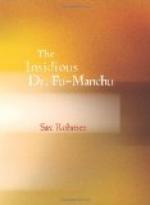“But brought what, Smith?” I cried, in
perplexity.
“What has he brought? An evil spirit?
A mental disease?
What is it? What can it be?”
“A new agent of death, Petrie! Something born in a plague-spot of Burma— the home of much that is unclean and much that is inexplicable. Heaven grant that we be in time, and are able to save Guthrie.”
CHAPTER XV
The train was late, and as our cab turned out of Waterloo Station and began to ascend to the bridge, from a hundred steeples rang out the gongs of midnight, the bell of St. Paul’s raised above them all to vie with the deep voice of Big Ben.
I looked out from the cab window across the river to where, towering above the Embankment, that place of a thousand tragedies, the light of some of London’s greatest caravanserais formed a sort of minor constellation. From the subdued blaze that showed the public supper-rooms I looked up to the hundreds of starry points marking the private apartments of those giant inns.
I thought how each twinkling window denoted the presence of some bird of passage, some wanderer temporarily abiding in our midst. There, floor piled upon floor above the chattering throngs, were these less gregarious units, each something of a mystery to his fellow-guests, each in his separate cell; and each as remote from real human companionship as if that cell were fashioned, not in the bricks of London, but in the rocks of Hindustan!
In one of those rooms Graham Guthrie might at that moment be sleeping, all unaware that he would awake to the Call of Siva, to the summons of death. As we neared the Strand, Smith stopped the cab, discharging the man outside Sotheby’s auction-rooms.
“One of the doctor’s watch-dogs may be in the foyer,” he said thoughtfully, “and it might spoil everything if we were seen to go to Guthrie’s rooms. There must be a back entrance to the kitchens, and so on?”
“There is,” I replied quickly. “I have seen the vans delivering there. But have we time?”
“Yes. Lead on.”
We walked up the Strand and hurried westward. Into that narrow court, with its iron posts and descending steps, upon which opens a well-known wine-cellar, we turned. Then, going parallel with the Strand, but on the Embankment level, we ran round the back of the great hotel, and came to double doors which were open. An arc lamp illuminated the interior and a number of men were at work among the casks, crates and packages stacked about the place. We entered.
“Hallo!” cried a man in a white overall, “where d’you think you’re going?”
Smith grasped him by the arm.
“I want to get to the public part of the hotel without being seen from the entrance hall,” he said. “Will you please lead the way?”
“Here—” began the other, staring.
“Don’t waste time!” snapped my friend, in that tone of authority which he knew so well how to assume. “It’s a matter of life and death. Lead the way, I say!”




